In both personal and professional settings, maintaining healthy boundaries is crucial for fostering respectful relationships and creating a positive environment.
We’ve all encountered situations where someone has overstepped their bounds and intruded into our affairs.
While it’s important to assert ourselves, doing so in a professional and diplomatic manner can be a valuable skill to possess.
In this blog post, we will explore how to professionally say mind your own business and the art of professionally saying “mind your business” by presenting a range of synonyms and alternative phrases that can be used in various contexts.
Whether you’re faced with nosy colleagues, inquisitive friends, or meddlesome acquaintances, we’ve got you covered with over 200 Professional way to say mind your own business and express your desire for privacy and set respectful boundaries.
From polite and diplomatic approaches to funny and sassy retorts, we’ll delve into a wide array of options suitable for personal, workplace, or professional settings.
So, whether you’re seeking a subtle redirection, a witty comeback, or a savage shutdown, get ready to enhance your communication repertoire and navigate delicate situations with finesse.
Join us as we unlock the secrets to professionally saying “mind your own business” and strike the perfect balance between asserting your boundaries and maintaining a harmonious atmosphere.
Table of Contents
Mind your own business meaning
What does mind your business mean? The phrase “mind your business” or “mind your own business” is an idiomatic expression that is often used to advise someone to focus on their own affairs and not interfere or pry into the affairs of others. It is a reminder to respect personal boundaries and privacy.
When someone tells you to “mind your own business,” they are essentially asking you to refrain from getting involved in matters that do not concern you.
It suggests that you should concentrate on your own life, responsibilities, and interests rather than meddling in the affairs of others.
This phrase can be used to deter nosy or intrusive behavior, gossiping, or unwarranted interference.
It promotes the idea of respecting individual autonomy and the right to privacy. By minding your own business, you are encouraged to focus on yourself and allow others to do the same without unnecessary interference or judgment.
Also read: How To Professionally Say That’s Not My Job, This Is Your Job Or Do Your Job? (100+ Example Phrases)
Is it rude to tell someone to mind their own business?
Telling someone to “mind their own business” can be perceived as rude or impolite, depending on the context and tone in which it is delivered.
It is important to consider the relationship and the specific situation before using such a phrase.
While the expression is commonly used to set boundaries and discourage intrusive behavior, it can come across as dismissive or confrontational if used inappropriately or without sensitivity.
It is advisable to use this phrase cautiously and only when necessary, particularly if you wish to maintain a respectful and amicable conversation or relationship with the person involved.
Instead of using potentially confrontational phrases, it may be more effective to communicate your boundaries or concerns in a polite and direct manner.
Clear and respectful communication is often key to resolving misunderstandings and maintaining positive relationships with others.
What to say instead of mind your own business?
Instead of telling someone to “mind their own business,” there are alternative phrases or approaches you can use to communicate your boundaries or express that a certain topic is not up for discussion. Here are a few examples:
1. “I appreciate your concern, but I prefer to handle this on my own.”
2. “I’m comfortable dealing with this matter independently.”
3. “I’d rather not discuss this topic right now, but thanks for understanding.”
4. “I understand you’re curious, but I’d rather keep this private.”
5. “I’d prefer to keep the details to myself, if you don’t mind.”
6. “I’d appreciate it if we could shift the conversation to a different topic.”
7. “Let’s focus on our own matters for now, shall we?”
8. “I’m sure you mean well, but I’d rather handle this myself.”
9. “I’d prefer to keep my personal life separate from this discussion.”
10. “I’d rather not involve others in this situation.”
11. “This is something I’d like to deal with privately.”
12. “I’m not comfortable sharing those details at the moment.”
13. “I’d prefer to keep the details confidential, if you don’t mind.”
14. “I value my privacy, so I’d rather not discuss this further.”
15. “I understand you’re curious, but I’d rather keep this to myself for now.”
These alternatives aim to assert your boundaries and communicate your desire to maintain privacy or redirect the conversation without being harsh or confrontational.
It’s important to choose the phrase that suits the situation and the relationship dynamics while keeping the conversation respectful and considerate.
Also read: How To Say None Of Your Business Politely? 60+ Professional And Sarcastic Responses
How to professionally say mind your own business?
How to say mind your business professionally? Telling someone to “mind their own business” can come off as rude or confrontational. Instead, opt for more professional and respectful language.
Avoid phrases that directly tell someone to stop interfering, such as “It’s none of your concern” or “That’s not your business.” Instead, use phrases that tactfully redirect the conversation or establish boundaries.
For example, you might say, “I appreciate your interest, but I’d prefer to handle this matter privately,” or “This is a sensitive topic for me, so I’d rather not discuss it.”
If someone is prying into work matters, you could say, “I understand your concern, but I believe this issue falls within my area of responsibility.”
These alternatives maintain respect and professionalism while still conveying the message that the other person should focus on their own affairs.
Let’s explore how do you professionally tell someone to mind their own business for different situations in personal and professional settings.
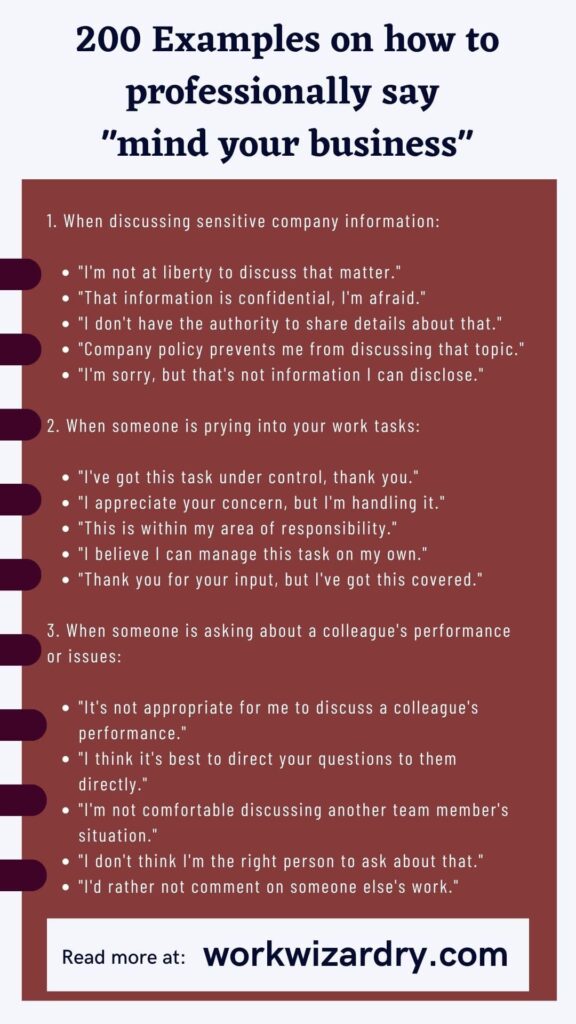
200 Professional way to say mind your own business
Here is a list of examples on how to politely tell someone to mind their own business at work for different situations:
1. When discussing sensitive company information:
- “I’m not at liberty to discuss that matter.”
- “That information is confidential, I’m afraid.”
- “I don’t have the authority to share details about that.”
- “Company policy prevents me from discussing that topic.”
- “I’m sorry, but that’s not information I can disclose.”
2. When someone is prying into your work tasks:
- “I’ve got this task under control, thank you.”
- “I appreciate your concern, but I’m handling it.”
- “This is within my area of responsibility.”
- “I believe I can manage this task on my own.”
- “Thank you for your input, but I’ve got this covered.”
3. When someone is asking about a colleague’s performance or issues:
- “It’s not appropriate for me to discuss a colleague’s performance.”
- “I think it’s best to direct your questions to them directly.”
- “I’m not comfortable discussing another team member’s situation.”
- “I don’t think I’m the right person to ask about that.”
- “I’d rather not comment on someone else’s work.”
4. When someone is asking about your personal life at work:
- “I prefer to keep my personal life separate from work.”
- “I’d rather not discuss personal matters in the workplace.”
- “I appreciate your interest, but I like to keep my private life private.”
- “I’m here to focus on work, not personal matters.”
- “Let’s keep our conversation focused on professional topics.”
5. When someone is trying to involve you in office gossip:
- “I don’t feel comfortable discussing this.”
- “I prefer to stay out of office gossip.”
- “I think it’s best to focus on our work.”
- “I’d rather not engage in speculation about colleagues.”
- “Let’s concentrate on our tasks instead of discussing others.”
6. When someone is asking about your decision-making process:
- “I appreciate your interest, but my decision-making process is quite personal.”
- “I’ve got a handle on this, thank you.”
- “I prefer to make these decisions independently.”
- “I’ve considered all aspects and am confident in my decision.”
- “I value your input, but this is a decision I need to make on my own.”
7. When someone is questioning your expertise or skills:
- “I’ve been trained to handle this, thank you.”
- “I appreciate your concern, but I’m confident in my abilities.”
- “I’ve got the necessary skills and experience for this task.”
- “I’m fully qualified to handle this situation.”
- “Rest assured, I know what I’m doing.”
8. When someone is trying to micromanage your work:
- “I appreciate your guidance, but I’d like to try this on my own.”
- “I understand your perspective, but I have my own approach.”
- “I value your input, but I need some space to work independently.”
- “I believe I can handle this task without supervision.”
- “I think it’s best if I tackle this task in my own way.”
9. When someone is asking about a conflict or disagreement at work:
- “I’d rather not discuss this matter publicly.”
- “It’s not appropriate for me to comment on this situation.”
- “I think it’s best to let the involved parties handle this.”
- “I don’t feel comfortable discussing conflicts at work.”
- “I prefer to stay neutral and not comment on this issue.”
10. When someone is asking about your future plans or career progression:
- “I prefer to keep my future plans private.”
- “I’m focusing on the present and my current responsibilities.”
- “I’d rather not discuss my career progression at this time.”
- “My future plans are a personal matter.”
- “I appreciate your interest, but I’m not ready to share my plans.”
Also read: How To Professionally Say That Sounds Like A You Problem? (30 Polite Responses)
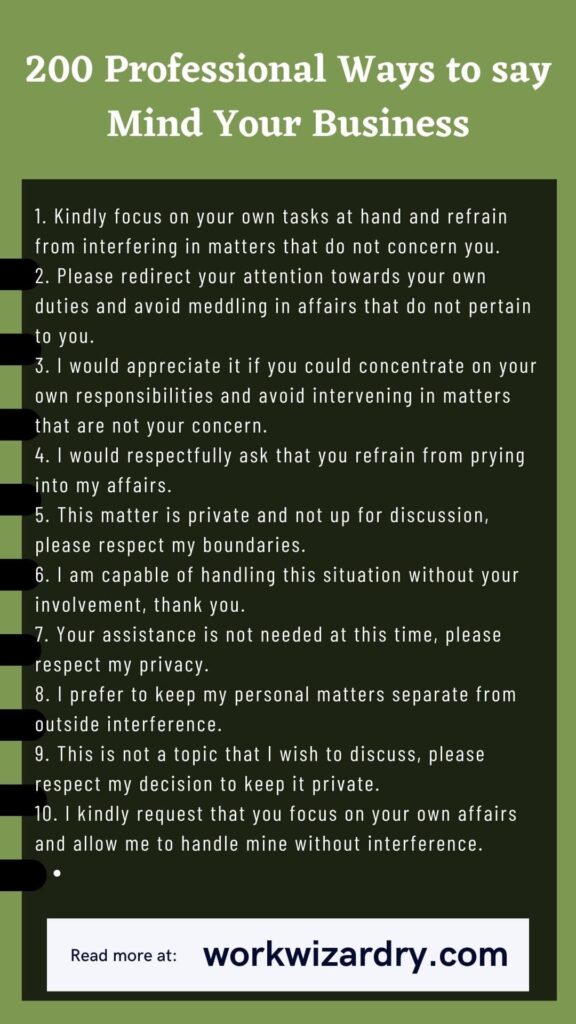
Professional way to say mind your business during personal conversation
Here are some more professional ways to say mind your business during personal conversation with someone:
1. Kindly focus on your own tasks at hand and refrain from interfering in matters that do not concern you.
2. Please redirect your attention towards your own duties and avoid meddling in affairs that do not pertain to you.
3. I would appreciate it if you could concentrate on your own responsibilities and avoid intervening in matters that are not your concern.
4. I would respectfully ask that you refrain from prying into my affairs.
5. This matter is private and not up for discussion, please respect my boundaries.
6. I am capable of handling this situation without your involvement, thank you.
7. Your assistance is not needed at this time, please respect my privacy.
8. I prefer to keep my personal matters separate from outside interference.
9. This is not a topic that I wish to discuss, please respect my decision to keep it private.
10. I kindly request that you focus on your own affairs and allow me to handle mine without interference.
11. It would be best if you could concentrate on your own obligations and refrain from meddling in matters that do not relate to you.
12. I suggest you focus on your own tasks and avoid interfering in matters that are not within your purview.
13. Your attention is required on your own tasks, kindly refrain from meddling in affairs that do not involve you.
14. I advise you to concentrate on your own duties and avoid interfering in matters that are not your responsibility.
15. I would respectfully request that you concentrate on your own tasks and avoid meddling in matters that are not your concern.
16. It is recommended that you focus on your own obligations and refrain from interfering in matters that are not within your jurisdiction.
17. I urge you to prioritize your own responsibilities and abstain from intervening in matters that do not relate to you.
18. Kindly refrain from interfering in matters that do not concern you.
19. I appreciate your concern, but this is a personal matter that I prefer to handle on my own.
20. Your input is not necessary nor requested in this situation.
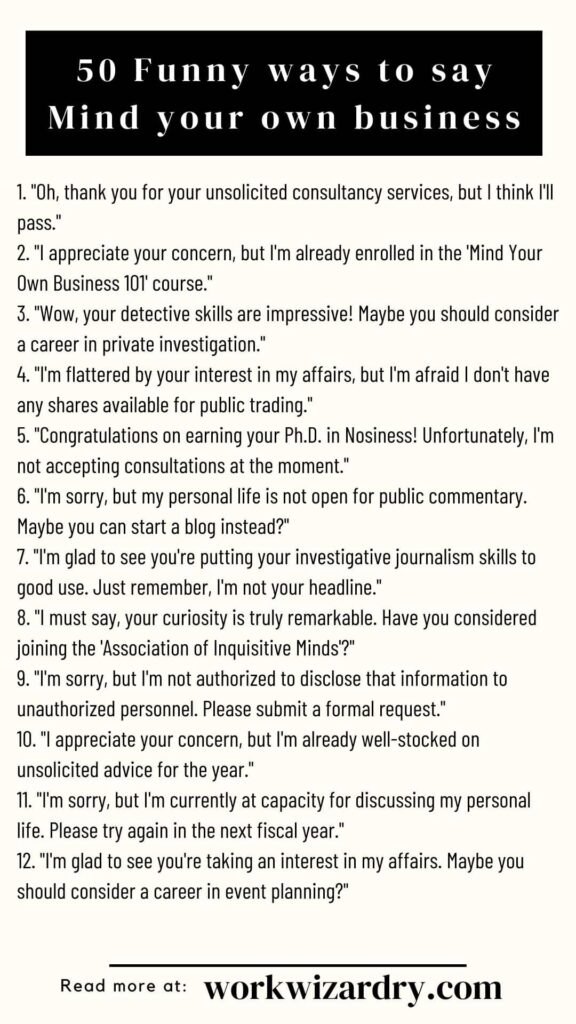
Funny ways to tell someone to mind their own business professionally
Here are some funny ways to tell someone to mind their own business:
1. “Oh, thank you for your unsolicited consultancy services, but I think I’ll pass.”
2. “I appreciate your concern, but I’m already enrolled in the ‘Mind Your Own Business 101’ course.”
3. “Wow, your detective skills are impressive! Maybe you should consider a career in private investigation.”
4. “I’m flattered by your interest in my affairs, but I’m afraid I don’t have any shares available for public trading.”
5. “Congratulations on earning your Ph.D. in Nosiness! Unfortunately, I’m not accepting consultations at the moment.”
6. “I’m sorry, but my personal life is not open for public commentary. Maybe you can start a blog instead?”
7. “I’m glad to see you’re putting your investigative journalism skills to good use. Just remember, I’m not your headline.”
8. “I must say, your curiosity is truly remarkable. Have you considered joining the ‘Association of Inquisitive Minds’?”
9. “I’m sorry, but I’m not authorized to disclose that information to unauthorized personnel. Please submit a formal request.”
10. “I appreciate your concern, but I’m already well-stocked on unsolicited advice for the year.”
11. “I’m sorry, but I’m currently at capacity for discussing my personal life. Please try again in the next fiscal year.”
12. “I’m glad to see you’re taking an interest in my affairs. Maybe you should consider a career in event planning?”
13. “I’m flattered by your attention to detail, but I’m afraid my personal life is not open for public review.”
14. “I appreciate your enthusiasm for my life choices, but I’m already fully booked on opinions.”
15. “I’m sorry, but I’m not accepting applications for a personal life commentator at the moment.”
16. “I’m glad to see you’re invested in my affairs. Maybe you should consider diversifying your portfolio.”
17. “I must say, your dedication to monitoring my activities is truly commendable. Have you considered a career in surveillance?”
18. “I appreciate your concern, but I’m already receiving my daily dose of unsolicited feedback.”
19. “I’m sorry, but I’m not accepting subscriptions to my personal newsletter at this time.”
20. “I’m glad to see you’re taking an interest in my life. Maybe you should consider writing a biography instead?”
Also read: How To Say No Worries Professionally In Email? (25 Example Email Templates)
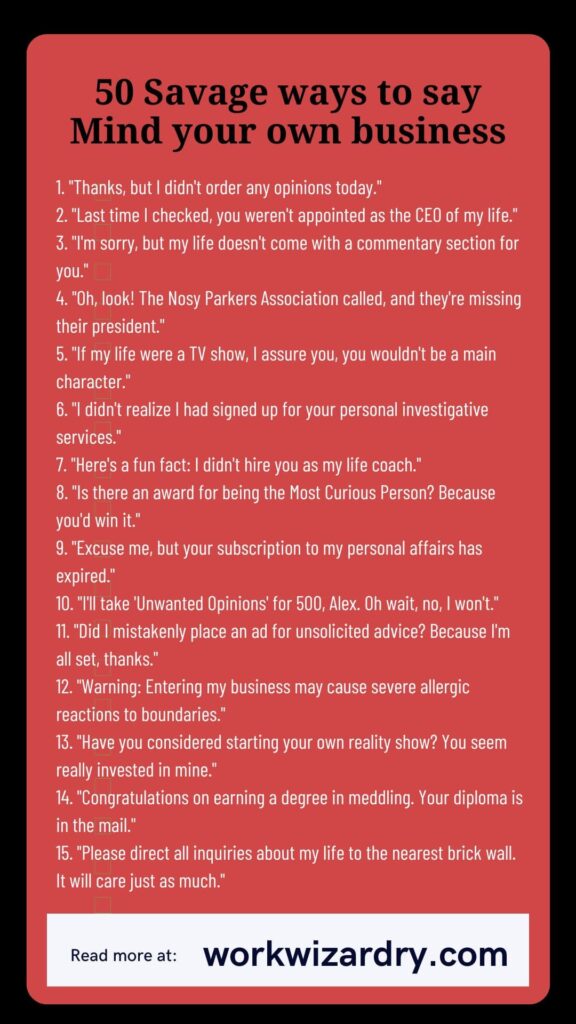
Savage ways to say mind your own business
Here are some savage ways to say mind your own business:
1. “Thanks, but I didn’t order any opinions today.”
2. “Last time I checked, you weren’t appointed as the CEO of my life.”
3. “I’m sorry, but my life doesn’t come with a commentary section for you.”
4. “Oh, look! The Nosy Parkers Association called, and they’re missing their president.”
5. “If my life were a TV show, I assure you, you wouldn’t be a main character.”
6. “I didn’t realize I had signed up for your personal investigative services.”
7. “Here’s a fun fact: I didn’t hire you as my life coach.”
8. “Is there an award for being the Most Curious Person? Because you’d win it.”
9. “Excuse me, but your subscription to my personal affairs has expired.”
10. “I’ll take ‘Unwanted Opinions’ for 500, Alex. Oh wait, no, I won’t.”
11. “Did I mistakenly place an ad for unsolicited advice? Because I’m all set, thanks.”
12. “Warning: Entering my business may cause severe allergic reactions to boundaries.”
13. “Have you considered starting your own reality show? You seem really invested in mine.”
14. “Congratulations on earning a degree in meddling. Your diploma is in the mail.”
15. “Please direct all inquiries about my life to the nearest brick wall. It will care just as much.”
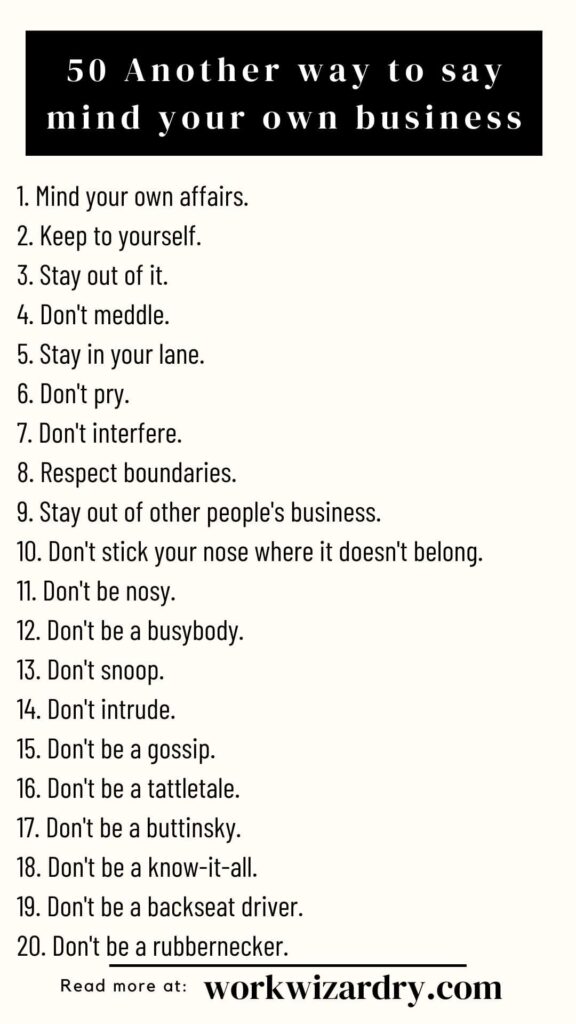
Another way to say mind your own business
Here are some synonyms or another ways to say mind your own business:
1. Mind your own affairs.
2. Keep to yourself.
3. Stay out of it.
4. Don’t meddle.
5. Stay in your lane.
6. Don’t pry.
7. Don’t interfere.
8. Respect boundaries.
9. Stay out of other people’s business.
10. Don’t stick your nose where it doesn’t belong.
11. Don’t be nosy.
12. Don’t be a busybody.
13. Don’t snoop.
14. Don’t intrude.
15. Don’t be a gossip.
16. Don’t be a tattletale.
17. Don’t be a buttinsky.
18. Don’t be a know-it-all.
19. Don’t be a backseat driver.
20. Don’t be a rubbernecker.
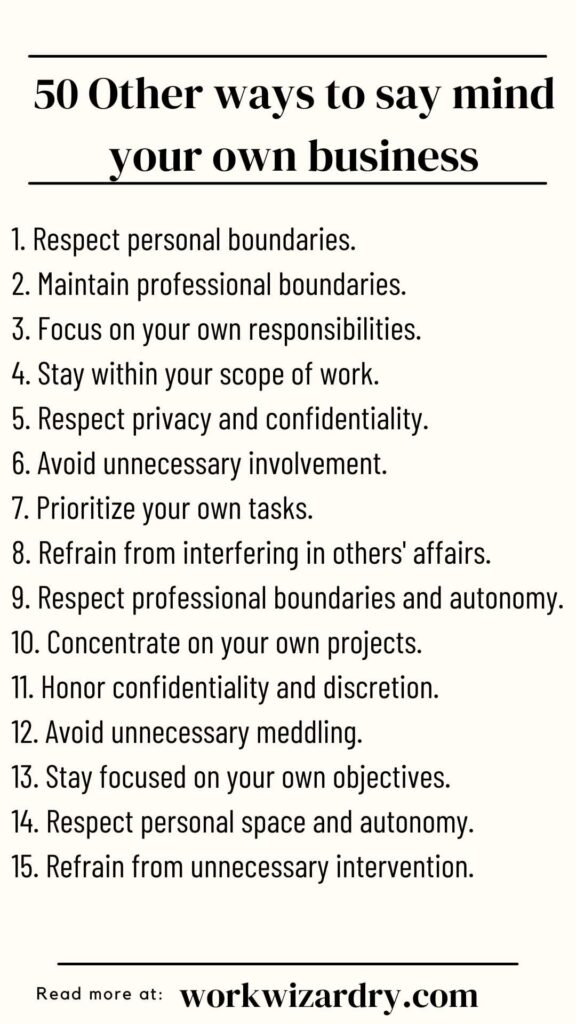
Other ways to say mind your own business
Here are some synonyms or other ways to say mind your own business in a professional manner:
1. Respect personal boundaries.
2. Maintain professional boundaries.
3. Focus on your own responsibilities.
4. Stay within your scope of work.
5. Respect privacy and confidentiality.
6. Avoid unnecessary involvement.
7. Prioritize your own tasks.
8. Refrain from interfering in others’ affairs.
9. Respect professional boundaries and autonomy.
10. Concentrate on your own projects.
11. Honor confidentiality and discretion.
12. Avoid unnecessary meddling.
13. Stay focused on your own objectives.
14. Respect personal space and autonomy.
15. Refrain from unnecessary intervention.
16. Concentrate on your own professional development.
17. Respect the autonomy of others.
18. Avoid unnecessary prying.
19. Focus on your own career goals.
20. Respect the boundaries of others’ work.
These phrases can be used in professional settings to convey the same message as “Mind your own business” while maintaining a professional tone.
Also read: How To Professionally Say Don’t Talk To Me Like That And Don’t Be Rude? (35+ Examples And Tips)
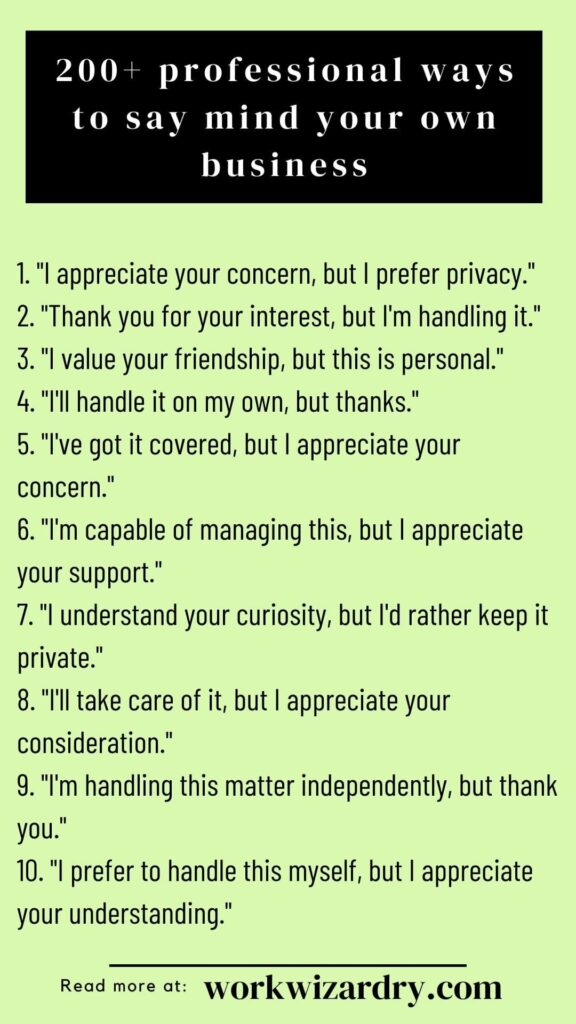
Nice way to say mind your own business
Here are some polite and nice ways to say mind your own business:
1. “I appreciate your concern, but I prefer privacy.”
2. “Thank you for your interest, but I’m handling it.”
3. “I value your friendship, but this is personal.”
4. “I’ll handle it on my own, but thanks.”
5. “I’ve got it covered, but I appreciate your concern.”
6. “I’m capable of managing this, but I appreciate your support.”
7. “I understand your curiosity, but I’d rather keep it private.”
8. “I’ll take care of it, but I appreciate your consideration.”
9. “I’m handling this matter independently, but thank you.”
10. “I prefer to handle this myself, but I appreciate your understanding.”
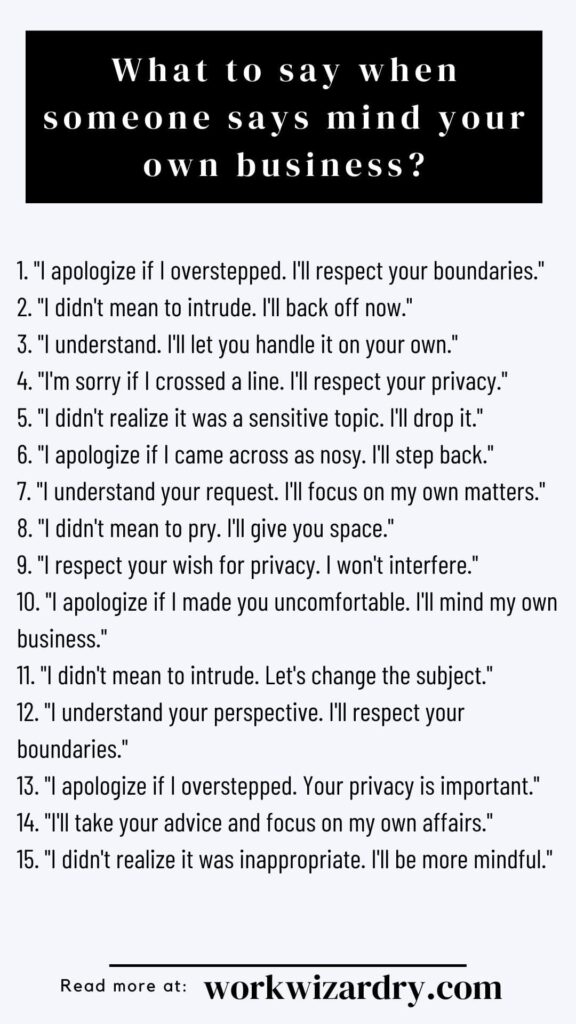
What to say when someone says mind your own business?
How to reply when someone says mind your own business? When someone tells you to “mind your own business,” it’s best to respond with respect and understanding. Here are a few possible responses:
1. “I apologize if I overstepped. I’ll respect your boundaries.”
2. “I didn’t mean to intrude. I’ll back off now.”
3. “I understand. I’ll let you handle it on your own.”
4. “I’m sorry if I crossed a line. I’ll respect your privacy.”
5. “I didn’t realize it was a sensitive topic. I’ll drop it.”
6. “I apologize if I came across as nosy. I’ll step back.”
7. “I understand your request. I’ll focus on my own matters.”
8. “I didn’t mean to pry. I’ll give you space.”
9. “I respect your wish for privacy. I won’t interfere.”
10. “I apologize if I made you uncomfortable. I’ll mind my own business.”
11. “I didn’t mean to intrude. Let’s change the subject.”
12. “I understand your perspective. I’ll respect your boundaries.”
13. “I apologize if I overstepped. Your privacy is important.”
14. “I’ll take your advice and focus on my own affairs.”
15. “I didn’t realize it was inappropriate. I’ll be more mindful.”
16. “I understand your request. I won’t pry any further.”
17. “I apologize for any discomfort caused. I’ll back off.”
18. “I respect your desire for space. I won’t interfere.”
19. “I’ll respect your boundaries and refrain from involvement.”
20. “I apologize if I crossed a line. I’ll respect your wishes.”
Also read: How To Say I Forgot Professionally? At Workplace Or In Email (80+ Examples And Tips)
Conclusion:
In conclusion, mastering the art of professionally saying “mind your own business” empowers us to establish boundaries while maintaining respectful relationships.
With a plethora of polite, funny, savage, and nice alternatives, we can navigate personal and professional settings with grace and assertiveness.
Remember, effective communication is key to fostering a harmonious environment.




